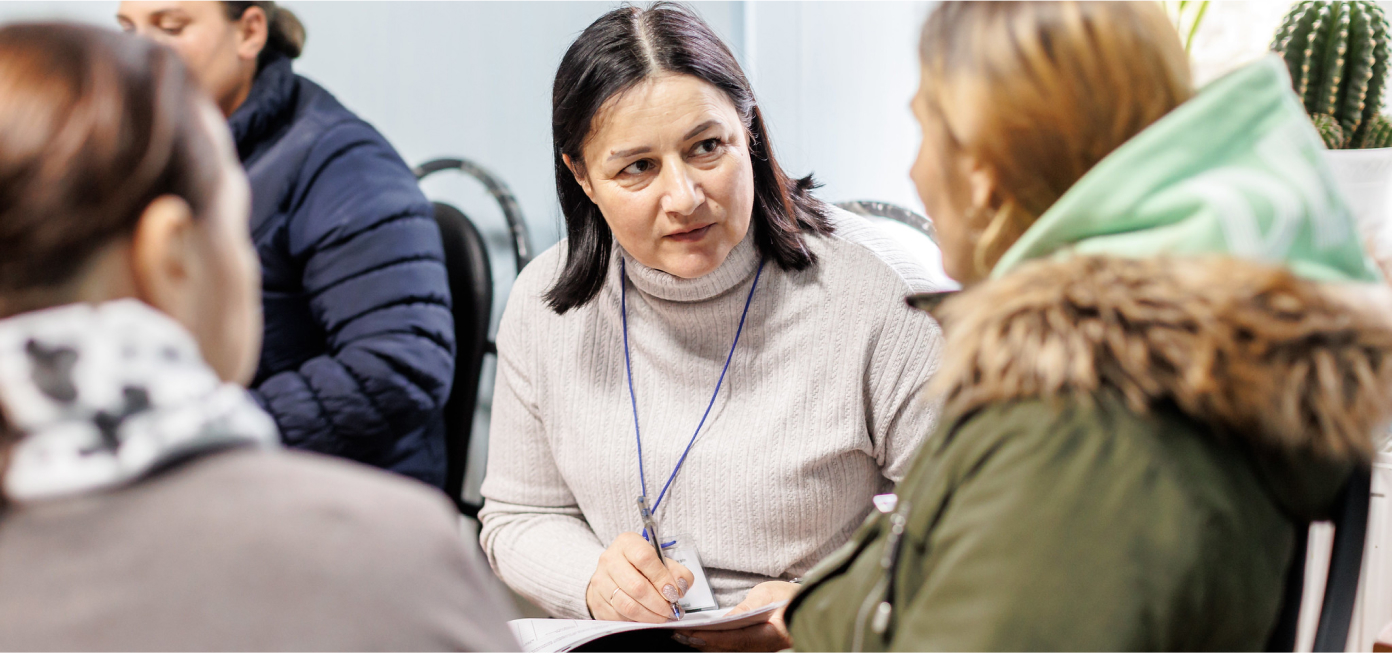To facilitate access of refugees to legal information and to the information about the temporary protection mechanisms, UNDP supported the development of a ChatBot Solution. Its beta version was piloted, pending validation.
In Edinet and Causeni districts, two mobile teams continued their operations to prevent and address gender-based violence, having provided legal, social and psychological services to almost 700 women and girls.
UNDP engaged 470 legal aid beneficiaries and providers, as well as justice professionals to carry out a legal needs assessment for improved planning and programming for the delivery of legal aid services.
In 2023, Moldova navigated a complex array of political and developmental challenges, exacerbated by the ongoing conflict in Ukraine and intersecting crises. The influx of refugees continued against the backdrop of challenging socioeconomic environment. Over 120 thousand refugees (out of which nearly 59 percent are women and girls) remained in the country as of end of December 2023. 1 Moldovan authorities and communities had to ensure that refugees had access to legal aid and justice services, a crucial type of support in any displacement and humanitarian context. Women refugees face additional risks, including gender discrimination and gender-based violence.
To enhance national capacities to respond both to the immediate needs of the Ukrainian refugees and to resolve systemic issues, UNDP continued implementing the project aimed at strengthening access to justice through legal empowerment of refugees. The project, supported by UNDP’s Global Programme for Strengthening the Rule of Law, Human Rights, Justice and Security for Sustainable Peace and Development reinforced the Humanitarian-Development-Peace nexus and had a leaving no one behind principle at its core. This UNDP’s initiative was integrated with and supported the realization of the 2022 UN inter-agency Regional Refugee Response Plan for Moldova, coordinated by the UN High Commissioner for Refugees (UNHCR) and the Government of Moldova.
Based on the good practices of the first year of the project implementation, UNDP continued training for paralegals to ensure they are well equipped with knowledge to assist and interact with refugees, asylum seekers and host communities. A six-day training programme for the newly enrolled paralegals was approved by the Moldovan National Legal Aid Council. In June 2023, 16 paralegals (including ten women) benefitted from the programme.
In Edinet and Causeni districts, two mobile teams continued their operations to prevent and address gender-based violence, having provided legal, social and psychological services to almost 700 women and girls (313 refugee women and 385 women from vulnerable groups from host communities). Furthermore, UNDP facilitated a learning needs assessment of the local authorities from Edinet and Causeni districts, as well as the Autonomous Territorial Unit of Gagauzia. As a result, a training programme was shaped, and 60 public officials (including 55 women) enhanced their knowledge of the domestic violence phenomenon, assistance and protection mechanisms, and counselling to refugees.

Ungheni mobile team assists Ukrainian refugees and survivors of violence directly in their communities in Moldova.
Photo: UNDP
UNDP carried out a legal needs assessment for improved planning and programming for the delivery of legal aid services. Engaging 470 respondents (legal aid beneficiaries and providers, as well as justice professionals), the study assessed the impact of the state-guaranteed legal aid system. The findings and recommendations of the survey will inform UNDP’s programming within its ongoing project “Enhancing access to justice for living in dignity”.
To facilitate access of refugees to legal information and to the information about the temporary protection mechanisms, UNDP supported the development of a ChatBot Solution. Designed to provide interactive personalized informational legal support for refugees and answer to frequently asked questions, the application help access the information about other services available for refugees in Moldova, such as the location of refugee centre and meal distribution, contacts of key institutions, and other information. The beta version of the ChatBot solution was piloted, pending validation. It will be finalised during UNDP’s project “Enhancing access to justice for living in dignity”, which co-sponsors this digital solution.
Lessons learned and good practices
Civil society organizations (CSOs) with proven experience, agility and innovative approaches were key implementing partners for UNDP in this project. The mobile team approach, implemented through the local CSOs, is one of the most versatile, efficient and less expensive solutions to reach both gender-based violence survivors and refugees in host communities.
Women have shown great interest in the services provided by the mobile teams, especially the opportunities for vocational training and economic empowerment. At the same time, it was identified that a long-term intervention, as well as the engagement of local authorities are required to achieve behavioural change of the beneficiaries of the mobile team model.
Since multiple partners were involved in project activities, the coordination processes took longer than expected. In addition, UNDP saw the lack of qualified offers for the legal needs assessment exercise which led to the readvertisement of calls and delays in the initiation of planned activities. A no-cost extension of the project was approved. The time was used to initiate the development of a chatbot solution to expand access to legal aid and remedies and secure the partnership with another UNDP project, co-sponsoring the solution.
Looking forward
The project contributed to the long-term viability and impact of the carried-out interventions. Through continued collaboration with project partners and stakeholders, UNDP remains committed to promoting equal access to justice and advancing the rights of all members of our community.